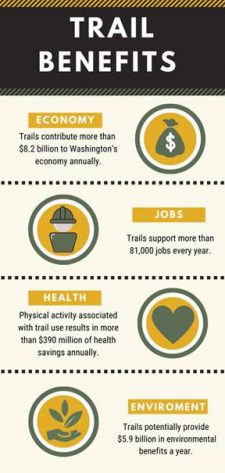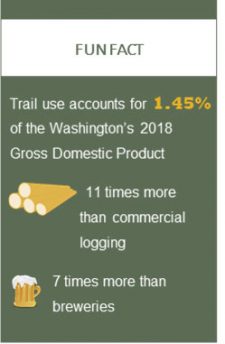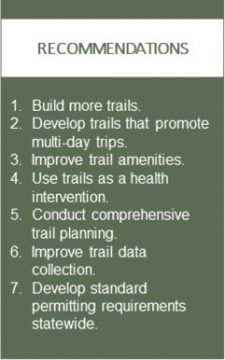Economy, Environment and Health Benefit from Trails, Two New Studies Show
Posted January 10, 2020 at 5:49 am by Tim Dustrude

This just in from the Washington State Recreation & Conservation Office…
 OLYMPIA–Trails contribute more than $8.2 billion to the state’s economy, according to companion studies released today by the Washington State Recreation and Conservation Office.
OLYMPIA–Trails contribute more than $8.2 billion to the state’s economy, according to companion studies released today by the Washington State Recreation and Conservation Office.
Done in collaboration with Washington Trails Association, Washington Bikes, and the University of Washington, the studies look at the economic, environmental, social and health benefits of trails and recommend that state leaders develop more trails and use them as a way to improve the health of Washingtonians.
One study, Economic, Environmental, & Social Benefits of Recreational Trails in Washington State, estimates that trail-based activities improve health and reduce medical costs by more than $390 million a year for Washington residents. In addition, trails support 81,000 jobs annually.
“We know that trails provide a lot of benefits. People are healthier when they use trails, trails are good for local businesses and trails are better for the environment,” said Kaleen Cottingham, director of the state Recreation and Conservation Office. “It just makes sense that state and local leaders should invest in this valuable commodity. Not only will people benefit, but so will the state overall.”
 A companion report, Health Benefits of Contact with Nature, looks at the health benefits associated with trails and other outdoor activities. It notes an abundance of benefits from hiking, biking and walking such as improved heart and lung fitness, fewer cardiovascular risk factors, fewer deaths and less coronary heart disease, cancer risk and obesity. It also notes that outdoor exercise, such as on trails, can improve mood, restore attention and decrease anger, depression and stress.
A companion report, Health Benefits of Contact with Nature, looks at the health benefits associated with trails and other outdoor activities. It notes an abundance of benefits from hiking, biking and walking such as improved heart and lung fitness, fewer cardiovascular risk factors, fewer deaths and less coronary heart disease, cancer risk and obesity. It also notes that outdoor exercise, such as on trails, can improve mood, restore attention and decrease anger, depression and stress.
“This is critical because Washington has more adults suffering from depression and mental illness, and children reporting more major depressive episodes each year than the national average,” Cottingham said. “Children especially can benefit from being outdoors because it is more conducive to social play, emotional development and improved thinking than indoor activity.”
“These studies show what hikers already know–getting out in nature is more than a hobby,” said Jill Simmons, chief executive officer of Washington Trails Association. “It is good for our minds and bodies. When you consider both the economic and health benefits, it is clear that we need to invest more in our trails and public lands.”
“Bikes mean business. We’ve known this for a long time, but the findings of this study now paint a detailed picture of how communities across Washington State benefit from biking,” said Richard Smith, executive director of Washington Bikes. “In addition to boosting our state’s bottom line through industry, tourism and more, biking brings major benefits for our mental and physical health. By building more connected trails statewide, we’ll ensure that every Washingtonian has the opportunity to pedal into a healthier future–and Washington will continue to prosper.”
Commissioned by the Legislature, the twin reports note that poor communities face more significant health challenges and more barriers to accessing trails than more affluent areas. The reports recommend using trails as a health intervention strategy by improving access and decreasing barriers to trails for poor communities.
The reports also recommend improving the state’s trail system by encouraging new trail development in strategic areas, such as where there are too few trails or overcrowded trails, and by encouraging trail development that promotes overnight trips, which generate more money because people are spending multiple days on trails. The reports also recommend improving trail amenities, such as parking and bathrooms, to attract more users.
 In addition, the reports recommend conducting comprehensive planning for trails in anticipation of more people living in Washington, improving collection of data on trail use and developing a standard permitting process statewide to make it easier to build trails.
In addition, the reports recommend conducting comprehensive planning for trails in anticipation of more people living in Washington, improving collection of data on trail use and developing a standard permitting process statewide to make it easier to build trails.
“People are getting outside more than ever, but decades of underinvestment have put Washington’s trail system under significant strain,” Simmons said. “Washington Trails Association is working to ensure trails can meet the growing demands of hikers today, tomorrow and forever. We believe these studies are a good first step in recognizing the value of trails and the need to invest in them at the level they deserve.”
Created in 1964, the Recreation and Conservation Office provides statewide leadership and funding to protect and improve the best of Washington’s natural and outdoor recreation resources.
Washington Trails Association is a nonprofit that mobilizes hikers and everyone who loves the outdoors, to explore, steward and champion public lands and trails.
Washington Bikes advocates for bicyclists and a more bicycle-friendly Washington.
You can support the San Juan Update by doing business with our loyal advertisers, and by making a one-time contribution or a recurring donation.
Categories: Government, Health & Wellness, Recreation










No comments yet. Be the first!
By submitting a comment you grant the San Juan Update a perpetual license to reproduce your words and name/web site in attribution. Inappropriate, irrelevant and contentious comments may not be published at an admin's discretion. Your email is used for verification purposes only, it will never be shared.